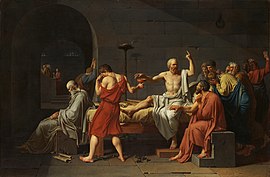Fallsoonys

She eab dy hoiggal as taishbyney yn chruinney as beays fallsoonys ny fallsoonaght. T'eh cur geill da cooishyn myr beays, fys, firrinys, aalid, shickyrys, aigney as glare.[1][2].
Ta fallsoonys cur barrant er resoonaghey as obbyr oardreilagh.[3]
Ta bun Shenn Ghreagish ec yn ockle: φιλοσοφία (philosophía), as y keeall "graih yn oayllys" echey[4][5]. Cha nel eh aashagh baght reaghit er y fockle y chur, as ta eie eh hene ec dagh scoillar fallsoonys. Ta Carl Friedrich von Weizsäcker er ngra: "Ta fallsoonys ny scoillaraght nagh nod oo loayrt er gyn jannoo eh dty hene."[6].
Ard-vanglaneyn fallsoonys, t'ad resoon (studeyrys er smooinaghtyn dy resoonagh), moraltaght (studeyrys er ymmyrkey beasagh), as metafissig (studeyrys er bun veays as feerid).
Banglaneyn fallsoonys
[reagh | edit source]Son y chooid smoo, t'ad goaill rish ny fir shoh myr banglaneyn smoo fallsoonys.
- Ta metafissig bentyn da dooghys beays as ny cruinney. T'eh goaill stiagh tuinney-oaylleeaght and ontoaylleeaght.
- Ta epistemoaylleeaght bentyn da dooghys as lheead oayllys, as my vel oayllys ayn ny dyn. Ta'n magher shoh goaill stiagh eddyr-obbraghey firrinys, credjue, and lowaltys eieyn.
- Ta moraltaght bentyn da ny lhisagh sleih jannoo, as my nod freggyrtyn erbee da'n chooish.
- Ta fallsoonys politickagh bentyn da studeyrys er reiltys, as eddyr-obbraghey persoonyn, possanyn, as yn ashoon. T'eh goaill stiagh cairys, leigh, cooid, as kiaryn as currymyn seyranee.
- Ta aesthetaght bentyn da aalid, ellyn, taitnys, tastid, as ennaghtaght.
- Ta resoon bentyn da coryssyn smooinaght ta leeideil veih bun fondagh dys briwnys firrinagh. Neayr's anmagh 'sy 19oo eash, ta maddaghteryrn (myr sampleyr, Frege) er nyannoo resoon rere saaseyn maddaghtoil. Ta daa rheynn mooar ec resoon jeianagh: resoonagh maddaghtoil (ny resoon cowreydagh formoil) as resoon fallsoonagh.
- Ta fallsoonys yn aigney bentyn da dooghys yn aigney as y kiangley eddyr ish as y corp. Ta kianglaghyn eddyr y vagher shoh as smooinaghtoaylleeaght.
- Ta fallsoonys glare bentyn da dooghys, bun as ymmyd ghlare.
Chammah's adsyn, ta fallsoonys er lheh ec y chooid smoo jeh magheryn ard-scoillaragh, myr sampleyr, fallsoonys oaylleeaght, fallsoonys hennaghys, ny fallsoonys vaddaght.
Imraaghyn
[reagh | edit source]- ↑ Jenny Teichmann; Katherine C. Evans (1999). Philosophy: A Beginner's Guide. Blackwell Publishing, 1. "Philosophy is a study of problems which are ultimate, abstract and very general. These problems are concerned with the nature of existence, knowledge, morality, reason and human purpose."
- ↑ A.C. Grayling (1998). Philosophy 1: A Guide through the Subject. Oxford University Press, 1. "The aim of philosophical inquiry is to gain insight into questions about knowledge, truth, reason, reality, meaning, mind, and value."
- ↑ Anthony Quinton (1995). ayns T. Honderich: The Oxford Companion to Philosophy. Oxford University Press, 666. "Philosophy is rationally critical thinking, of a more or less systematic kind about the general nature of the world (metaphysics or theory of existence), the justification of belief (epistemology or theory of knowledge), and the conduct of life (ethics or theory of value). Each of the three elements in this list has a non-philosophical counterpart, from which it is distinguished by its explicitly rational and critical way of proceeding and by its systematic nature. Everyone has some general conception of the nature of the world in which they live and of their place in it. Metaphysics replaces the unargued assumptions embodied in such a conception with a rational and organized body of beliefs about the world as a whole. Everyone has occasion to doubt and question beliefs, their own or those of others, with more or less success and without any theory of what they are doing. Epistemology seeks by argument to make explicit the rules of correct belief formation. Everyone governs their conduct by directing it to desired or valued ends. Ethics, or moral philosophy, in its most inclusive sense, seeks to articulate, in rationally systematic form, the rules or principles involved."
- ↑ Philosophia, Henry George Liddell, Robert Scott, A Greek-English Lexicon, ec Perseus
- ↑ Encyclopædia Britannica (eddyrlhieen). Feddynit er 2009-01-07. (from Greek, by way of Latin, philosophia, "love of wisdom") the critical examination of the grounds for fundamental beliefs and an analysis of the basic concepts employed in the expression of such beliefs.
- ↑ Carl Friedrich von Weizsäcker (1971). Die Einheit der Natur. "Philosophie ist die Wissenschaft, über die man nicht reden kann, ohne sie selbst zu betreiben."
| |||||
|
|
She bun ta'n art shoh. Cur rish, son foays y yannoo da Wikipedia. |
